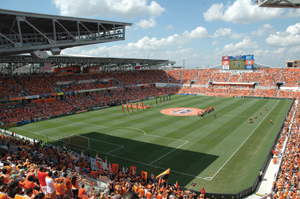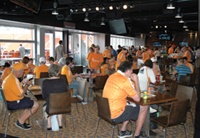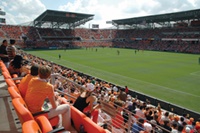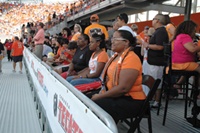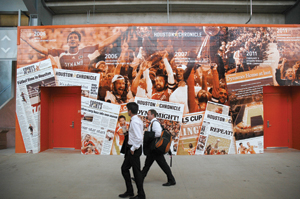Minutes before NBC opened the broadcast of the Houston Dynamo’s first game at its new stadium, an errant soccer ball flew past the anchor desk in the south end zone’s Heineken Terrace.
The wild kick during pregame warmups didn’t hurt anyone, but it won’t be the last time fans yell “Heads up!” at BBVA Compass Stadium, a cozy, single-concourse facility where all 22,000 spectators sit close to the action.
For the Dynamo, that intimacy defines a smartly developed facility built on a tight budget with hard construction costs of $65 million. AEG, the team’s co-owner and the stadium’s operator, financed the stadium, and
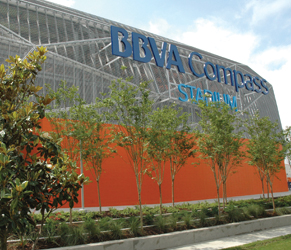 |
BBVA Compass Stadium seats 22,000, and roof canopies shade many from the afternoon sun. The aluminum mesh skin (left) is the stadium’s signature feature.
All photos by: DON MURET
|
the city and county covered infrastructure costs.
After five seasons playing soccer at Robertson Stadium, built 70 years ago for college football, the Dynamo has brought a new form of energy to its new home on the east edge of downtown Houston in a building splashed in bright orange. In a city where the other major league stadiums, the cavernous Minute Maid Park and Reliant Stadium, both have retractable roofs, the Dynamo now plays in an open-air setting that carries the feel of a large outdoor arena.
There is roof cover for most seats along the sidelines, but with no air conditioning in the bowl, the humid Gulf Coast climate can make for a sweaty experience, especially on a late Saturday afternoon in mid-May.
The trade-off is a building “where you feel like you can touch the last row,” said Tim Leiweke, AEG’s president and CEO, attending the game with his boss, AEG Chairman Phil Anschutz. “This is as intimate an experience in MLS as I have seen anywhere around the country.”
Those fans sitting in the last row up top enjoy the benefit of the breeze that blows through the aluminum mesh skin of the stadium’s facade and into the seating bowl. The exterior’s steely, futuristic look, the stadium’s signature feature, pays homage to Houston’s old industrial district and expresses the muscularity of the game of soccer, said Jeff Spear, an associate principal at Populous, the stadium’s architect.
Inside the facility, the metal wrap provides shade cover on the concourse, which helps cool the stadium, said Bruce Beahm, Populous’ associate principal for the project.
“We wanted to have a complete enclosure around the building,” Beahm said. “The skin does a lot of things. It’s working hard.”
Said Spear: “Take it off, and there’s really not much here. The
skin adds that uniqueness and a diamond-like quality to the place.”
BBVA Compass Stadium also stands out for its suites, startlingly close to event level: Its outdoor seats start at Row 9, closest to the pitch in Major League Soccer. The Dynamo made 31 of 36 suites available for long-term leases and sold the final one a few days before the May 12 home opener.
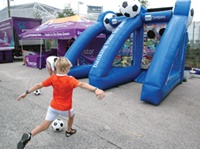 |
From top: Pregame dining at the West Side Club; the closest suites to the pitch in MLS; enjoying the shade on the Heineken Terrace in the south end zone; having a go at the BBVA Compass soccer display in the sponsor village outside the stadium.
|
Terms are $50,000 to $60,000 annually tied to three-year deals with 14 tickets for each game and 10 outdoor chairs. The cost covers all events, including Texas Southern University football games. The Southwestern Athletic Conference school is a tenant at the stadium.
In MLS, where other teams are having to consolidate blocks of unsold suites into larger club spaces, the location of the suites low in the bowl was a prime selling point, said Dynamo President Chris Canetti.
“We fully expect to lose a piece of glass this year with a corner kick or a side kick gone wide,” said Doug Hall, AEG Facilities’ general manager of the stadium. “There will definitely be a plate of nachos go in somebody’s lap if they’re not paying attention.”
There was also high demand for the President’s Club, the black-and-orange cushioned seats on the second level, midfield on the stadium’s west side. Those 214 seats, supported by the stadium’s club restaurant, sold out for $3,500 a year with a two-year commitment.
The cost covers all Dynamo games plus 10 other events, including this year’s El Salvador-New Zealand soccer match, USA-Italy rugby and a Sugarland concert.
“We had people with $99 five-game plans at Robertson that bought four President’s seats here, spending $28,000 over two years, Canetti said. “It wasn’t because people didn’t have the money. They just didn’t see the value in the building.”
The 120 field-side seats and 100 club seats on the east side of the building are protected by a roof canopy but still face the setting sun. Those patrons have access to a small air-conditioned
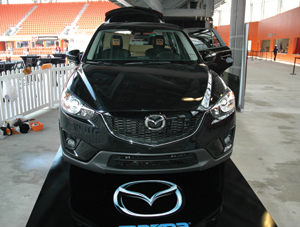 |
Top: The Houston Chronicle’s sponsorship of the press box is announced by a colorful timeline outside the room on the concourse. Above: New Dynamo sponsor Mazda has a model on the concourse, along with a branded parking lot.
|
space with a bar and grab-and-go foods to escape the heat and humidity.
“Our fans have become savvy and they don’t want to sit on the east side even though our studies show that with a 7:30 kickoff, there is very little time spent in the sun,” Canetti said. “The perception is still there, so we created this indoor bar and those seats sold out.”
All told, almost all of the 7,000 seats in the lower bowl have been sold as season tickets.
The party decks in both end zones, sponsored by Budweiser and Heineken, fill a growing need for corporate groups as the Dynamo competes for that market segment with the MLB Astros, its neighbor down the street. The cost is $80 a person and includes Levy Restaurants’ food buffet and access to a cash bar in the ticket price. At the opener, the Heineken Terrace — on the north end and, with room for 150 people, the larger of the two decks — carried a banner with its Tecate beer brand. Still, Heineken wall graphics and a beer stand set up on the terrace frame the space.
“A lot of companies are interested in coming to soccer games but they are not soccer fans to the point where they are going to buy a block of 40 seats and sit in the stands, so there has to be some sort of hospitality for it,” Canetti said.
The stadium’s eight founding partners signed deals valued at $300,000 to $600,000 annually, most of them three-year contracts. Of the eight, Mazda and Kroger supermarkets are new sponsors. Methodist Hospital and Statoil, a fast-growing Norwegian oil company doing business in Houston, sponsor the northwest and northeast gates, respectively.
The stadium’s two gates on the south side are available for sponsorship as well as the West Side Club and Center Circle Lounge. Panasonic, an AEG corporate partner, supplied the stadium’s video screen and LED ribbon boards, including the field-level video boards.
The Houston Chronicle sponsors the press box with a floor-to-ceiling wall display outside the room featuring newspaper covers documenting Dynamo milestone victories. The graphic plays a key role in developing a stadium that tells the Dynamo’s story.
“That’s why everything is orange,” Canetti said.


